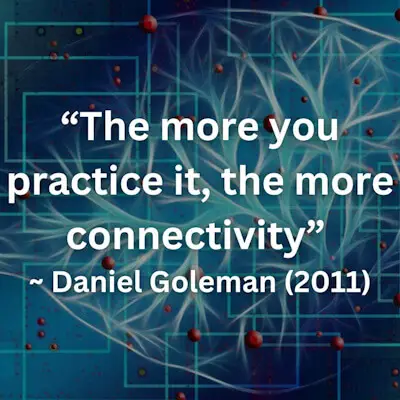- Home
- Emotional Intelligence
- Can Emotional Intelligence Be Learned?
Can Emotional Intelligence Be Learned? Discover Your Potential Today and Build Self-Awareness, Meaningful Relationships, and Lifelong Success.
When you ask, "Can emotional intelligence be learned?" you join decades of scientists and psychologists who have researched the same question. Their answer? Yes, it can - and current research continues to prove this to be true.
By Mark Connelly Published: 30 October 2023
 Your brain's neural pathways allow emotional intelligence to be learned
Your brain's neural pathways allow emotional intelligence to be learnedPhoto by Mohammad Usman
We know that emotional intelligence plays a central role in our daily lives, our relationships, and promotions at work. Research shows that emotional intelligence can be learned and improved through training programs.
This article reveals the science behind learning emotional intelligence, including insights into the brain's neural pathways and the value of deliberate practice. Discover scientifically validated methods to boost your emotional intelligence.
In this article
Defining Emotional Intelligence
The term Emotional intelligence (EI) can be traced back to the 1960’s, but it was the 1990’s that really launched EI into the public imagination.
When Daniel Goleman discovered an academic article by psychologists John Mayer and Peter Salovey he made EI the subject of his best selling book in 1995.

Soon after this EI hit the most valuable real estate in journalism, the cover of TIME Magazine.
These events blasted emotional intelligence into popular culture. EI moved from relative obscurity to become a cornerstone of our business and social life today.
Emotional intelligence refers to the ability to manage and understand emotions. Not only your emotions but the emotions of others as well. It’s the ability to empathize with others, to recognize the undertones in social situations, and choose how you respond using this information.
It’s not within the scope of this article to describe the specific domains and abilities of EI in depth. If you want to know more about this please read more here (opens in a new window so you can return to this article).
Can emotional intelligence be learned?
An employee at an international private bank faced a disciplinary procedure after numerous complaints about his emails. His emails were too blunt, too direct, and sometimes insulting. There had been no change, and so here he was, meeting with me as part of the disciplinary process. If he didn’t get it right he faced serious consequences.
Maybe therapy could help.
Using EI as a frame to address the problem he learned to notice his emotions when he was under pressure. Instead of firing off impulsive emails, he learned to consider his responses. He also recognized the desire his colleagues had for an harmonious workplace. After a few months he emailed them an apology, told them what he’d learned, and what he would be doing differently.
We met by chance in a lift a few years later. He smiled as he told me his career was back on track.
Research in psychology and neuroscience backs up his experience. EI can be learned. And it can make a big difference to your career.
And your relationships.

Show Me The… Evidence
 Research titles provide evidence that Emotional Intelligence can be learned.
Research titles provide evidence that Emotional Intelligence can be learned.Peer reviewed articles published in respected journals such as Frontiers in Psychology provide evidence that you can learn emotional intelligence.
Research shows that EI training programs are effective. There is evidence that the best results come from well designed programs taken over a period of time.
To write this article, I read a lot of research articles that show that EI can be learned. Here are extracts and links to 3 of the articles:
Development and validation of an online
emotional intelligence training program
"We created a comprehensive and empirically based online training program that… reliably improves both trait and ability EI outcomes and gains are sustained up to six months post-training.” (2023)
The impact of emotional intelligence
in the military workplace
“We provide evidence that EI training and EI interventions help, improve, and moderate the individual’s capacity to adapt to and manage stress and traumatic experiences.” (2020)
Increases in Emotional Intelligence After an Online Training Program Are Associated With Better Decision-Making on the Iowa Gambling Task
“…emotional intelligence can be trained with the help of an online training program … (the present study) also suggests that changes in emotional intelligence, as a result of such a program, can lead to improved emotion-guided decision-making.” (2019)
The Science Behind Emotional Intelligence
The science behind emotional intelligence proves that emotional intelligence is not fixed. It can be learned.
Cognitive neuroscience research uses advanced techniques such as neuroimaging to show how the neural pathways in our brain produce our thoughts and emotions.
Brain imaging studies suggest that emotional intelligence involves complex relationships between different areas of the brain. These include the amygdala, prefrontal cortex, and anterior cingulate cortex.
It’s complex because emotions are processed in these areas of the brain but are also shaped by our experiences and education.
 Illustration of neurons in the brain.
Illustration of neurons in the brain.
Not too long ago scientists believed that you were born with all the brain cells (neurons) that you would ever have.
The extraordinary discovery that our brains can grow new cells (neurogenesis) and form new connections (neuroplasticity) confirms that intentional training does rewire our brain.
London taxi drivers proved this is true in groundbreaking research that identified significant changes in their brain structure.
We should not underestimate the importance of neuroplasticity for emotional intelligence. It means that you can learn and improve emotional skills with conscious effort and practice.
When you consistently practice empathy, self-awareness, and emotional regulation your brain forms new neural pathways that strengthen these emotional intelligence skills.
Knowing that emotional intelligence can be learned leads us to ask a new question, "How can emotional intelligence be learned?".
Next, I’ll highlight research-backed methods that will help enhance your emotional intelligence.
How To Improve Emotional Intelligence
In therapy and coaching my clients often identify something they want more of.
When they say, “I want to be a better…(add your word here)” or, “I’m going to be more…” I ask them what the practice of this great idea looks like. If I followed you around, what would I see you doing that shows me this is important to you?
I’d ask the same of you when to comes to learning EI.
Actually, I’d add to it and say deliberate practice is essential to build EI. “Deliberate” because focused and intentional effort is required, and “practice” because you must convert your desire into action.
This isn’t just “practice” in the sense of ‘the more you practice the better you’ll get’. It’s a mindset of continual learning and a deliberate focus on the specific action and skill you want to improve.

Research shows that the best way to build EI is through focused EI coaching and training courses. You also need plenty of accurate feedback.
If you don’t want to hire a coach or join a training program there are things you can start doing on your own.
- Learn Mindfulness techniques to improve self awareness and your ability to manage your thoughts and responses.
- Journaling will help you get in touch with your emotions and improve self awareness.
- Empathy is a skill that is core to EI. Practice empathy when talking to others. Try to understand someone’s beliefs that are different to yours.
- Listen with intention. Practice active listening when you’re with other people.
- Learn to manage stress. Understand your stress triggers and manage how you respond.
So, how do I help my clients build EI? How can I help you to do the same?
Learn how to improve emotional intelligence in this article. I’ll also tell you about an excellent, affordable online program that uses a scientific approach and short daily sessions for improving emotional intelligence.
Can emotional intelligence be learned? Yes it can. Brain imaging studies and research on training programs demonstrate that you can learn and improve your emotional intelligence.
This new knowledge opens up opportunities for each of us to understand how to develop emotional intelligence skills, with huge benefits for our careers and relationships.
Focused EI coaching and training, along with accurate feedback, is the most effective method for building emotional intelligence.
Further references:
- Goleman, D. (1995). Emotional intelligence. Bantam Books, Inc
- Goleman, D (2006). Social Intelligence: The New Science of Human Relationships. Random House: New York.
- Goleman, D (2011). The Brain and Emotional Intelligence: New Insights. More Than Sound.







